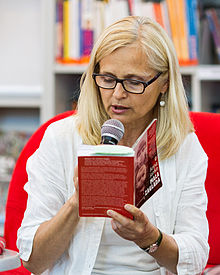
Jacek Józef Dukaj is a Polish science fiction and fantasy writer. He has received numerous literary prizes including the European Union Prize for Literature and Janusz A. Zajdel Award.

The Nike Literary Award is a literary prize awarded each year for the best book of a single living author writing in Polish and published the previous year. It is widely considered the most important award for Polish literature. Established in 1997 and funded by Gazeta Wyborcza, Poland's second largest daily paper, and the consulting company NICOM, it is conferred annually in October. It is open for nominees from all literary genres, including non-fiction essays and autobiographies. Each year, a nine-member jury selects the laureate in a three-stage process. Twenty official nominees are accepted in May, out of which seven finalists are declared in September. The final decision does not take place until the day of the award ceremony in October. The award consists of a statuette referring to the Greek goddess Nike, designed by the prominent Polish sculptor Kazimierz Gustaw Zemła, and a cash prize of currently PLN 100,000.

Jerzy Pilch was a Polish writer, columnist, and journalist. Critics have compared Pilch's style to Witold Gombrowicz, Milan Kundera, or Bohumil Hrabal.
The Kościelski Award is an independent Polish literary award, awarded since 1962 by the Geneva-based Kościelski Foundation. The jury issues annual awards to "promising writers" 40 years of age or younger.

Gdynia Literary Prize is a Polish literary prize, which is awarded annually to authors of the best books published in the previous year in the prose, poetry, essay and translation categories.
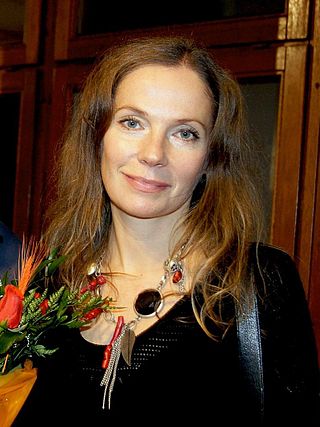
Joanna Bator is a Polish novelist, journalist, feminist and academic. She specializes in cultural anthropology and gender studies. She is the recipient of the 2013 Nike Award.

Magdalena Jadwiga Boczarska is a Polish actress who has appeared in more than 25 feature films since 2001. She has twice received the IFFI Best Actor Award (Female): Silver Peacock Award, at the 41st and the 44th International Film Festival of India for her roles in Little Rose and In Hiding.
The Ryszard Kapuściński Award is a major annual Polish international literary prize, the most important distinction in the genre of literary reportage.

Marcin Szczygielski is a Polish writer, journalist and graphic designer. He is an author of theatrical plays, and novels for adults and teenagers. Since December 2012, he has been a member of Stowarzyszenie Pisarzy Polskich.
The Zbigniew Herbert International Literary Award is a Polish international literature prize established in 2013 in Warsaw and named after a Polish poet, essayist, and moralist Zbigniew Herbert (1924–1998). It is conferred annually by the Zbigniew Herbert Foundation and its aim is to recognize "outstanding artistic and intellectual literary achievements on the world stage which have a bearing on the world of values towards which Zbigniew Herbert’s work gravitated".
The Angelus Central European Literature Award also known as Angelus Award is a Polish international literary award established in 2006 and presented by the city of Wrocław, Lower Silesia. The award is given annually for best prose books written in or translated into the Polish language by a living author originating from Central Europe whose works "undertake themes most relevant to the present day, encourage reflection and deepen the knowledge of the world of other cultures."

Leszek Włodzimierz Biały is a Polish writer, translator, and diplomat; since 2017 serving as an ambassador to Panama.

Maciej Hen is a Polish writer, translator and journalist.

The Sochy massacre occurred on 1 June 1943 in the village of Sochy, Lublin Voivodeship in Zamość County, Lublin Voivodeship during the German occupation of Poland when approximately 181–200 of its inhabitants, including women and children, were massacred by the German Ordnungspolizei and SS in retaliation for the village’s support for the Polish resistance movement.
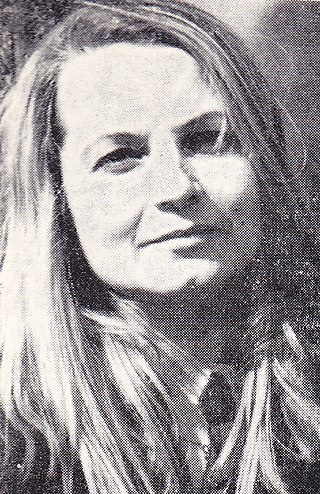
Teresa Ferenc was a Polish poet.
Zbigniew Jankowski, is a Polish poet, writer, essayist, literary critic.
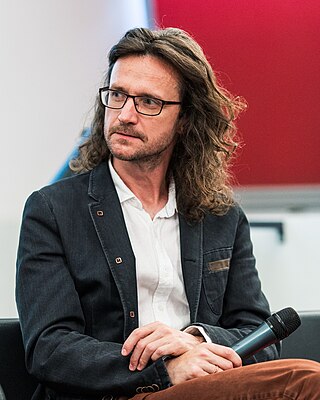
Maciej Płaza is a Polish writer, literary scholar and translator of English literature.

The Books of Jacob is an epic historical novel by Olga Tokarczuk, published by Wydawnictwo Literackie in October 2014. It is Tokarczuk's ninth novel and is the product of extensive historical research, taking her seven years to write.

Mirosław Tryczyk is a Polish philosopher, writer, reporter, and Holocaust researcher.
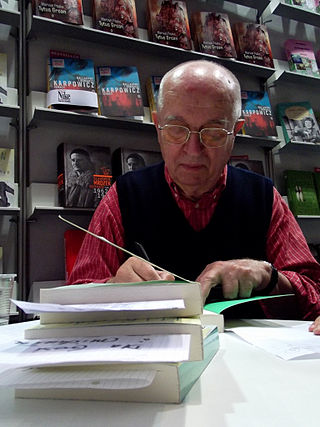
Marian Pilot is a Polish writer, poet, journalist and screenwriter. He received the 2011 Nike Award, Poland's most important literary prize, for his novel Pióropusz (Plume).
